
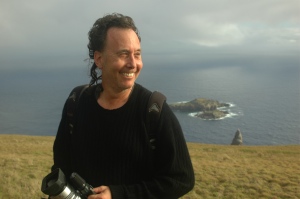
Michael Tobias on once lush, now barren Easter Island
Michael Tobias is a global ecologist, author, filmmaker, and President of the Dancing Star Foundation, a California non-profit public benefit corporation devoted to animal welfare, international biodiversity conservation and environmental education.
Tobias’ research and expertise encompasses numerous areas of enquiry and have taken him to some 80 countries. He has specialized in an interdisciplinary approach to critical environmental issues involving historical, scientific, ethical and philosophical frameworks for policy research and documentation, demographic analysis, ecological anthropology, biodiversity conservation, art history, comparative literature, the history of ideas, sustainability issues, animal protection and non-violence activism. In 1996, Tobias received the “Courage of Conscience Award” for his commitment to animals. In 2004 he was awarded the Parabola Focus Award for his lifetime body of work.
Tobias obtained his Ph.D. in the History of Consciousness at the University of California-Santa Cruz and has lectured widely. He was an Assistant Professor of Environmental Studies & Adjunct Assistant Professor of English and the Humanities at Dartmouth College, an Associate Professor of Humanities at California State University-Northridge, the Garrey Carruthers Chair of Honors and Distinguished Visiting Professor at the University of New Mexico-Albuquerque and a Distinguished Visiting Professor of Environmental Studies and, subsequently, Regents’ Lecturer, at the University of California-Santa Barbara in the Environmental Department.
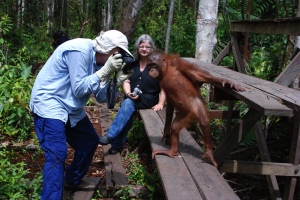
Michael Tobias in Borneo
Tobias is the author of 37 books (including several edited anthologies of both fiction and non-fiction). Some of his better-known works include: World War III: Population and the Biosphere at the End of the Millennium, Preface by Jane Goodall; A Vision of Nature: Traces of the Original World; Nature’s Keepers: On the Frontlines of the Fight to Save Wildlife in America; A Day in the Life of India; Voices From the Underground: For the Love of Animals; Environmental Meditation; Life Force: The World of Jainism; Voice of the Planet; Kinship With Animals (co-edited); The Soul of Nature (co-edited); A Parliament of Science: Science For the 21st Century (co-edited); A Parliament of Minds: Philosophy for a New Millennium (co-edited) and A Parliament of Souls: In Search of Global Spirituality (co-edited).
Tobias has written, directed, and produced well over 100 films–including TV series, documentaries and dramas, most pertaining to environmental, cultural, social or scientific issues. Some of those works include the 15-part series A Parliament of Minds, the 28-part series A Parliament of Souls, the ten-hour dramatic miniseries Voice of the Planet, and such other works as Ahimsa: Non-Violence, Black Tide, Antarctica: The Last Continent, A Day in the Life of India, A Day in the Life of Ireland, World War III, The Sky’s On Fire, River of Love, America’s Great Parks, Element One, The Hydrogen Age, The Cost of Cool, and three new feature films, Mad Cowboy, No Vacancy and Hotspots, a six-hour trilogy for public broadcasting.
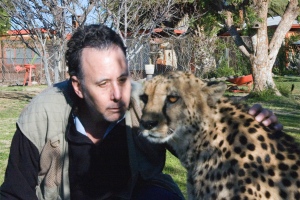
Michael Tobias at Harnas Sanctuary in Namibia
Tobias’ work has been viewed and/or read in more than 140 countries. In her Preface to Tobias’ book World War III, Jane Goodall writes “In “World War III” Tobias raises a clarion call. A call for aid such as in the olden days would summon knights in shining armor to fight under the banner of their king. And now we are all summoned, each and every one of us...I hope that those reading this book will join Tobias on the path toward the more sustainable and compassionate future, trying to live again as we once did, in harmony with nature, and no longer at war.” Psychology Today Magazine writes, “Tobias throws sparks like an evangelist and has the old-fashioned, wide-ranging erudition of a Renaissance scholar.” And ecological historian Dr. Rod Nash says “in an age of increasing specialization, it is extraordinary to encounter an author as widely learned as Michael Tobias. Quite simply, he is among the most imaginative, creative minds working in the vital field of human experience and the natural world. He should be regarded as the Carl Sagan of the Humanities.”
During the 1980s Tobias was the Science & Current Affairs Producer for PBS-San Francisco (KQED) and the Executive Producer in Charge of International Productions for the third largest PBS station in the U.S., Maryland Public Broadcasting.
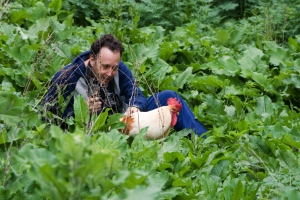
Michael Tobias at Farm Sanctuary in New York
Tobias’ work has been viewed and/or read in more than 140 countries. In her Preface to Tobias’ book World War III, Jane Goodall writes, “Tobias raises a clarion call. A call for aid such as in the olden days would summon knights in shining armor to fight under the banner of their king. And now we are all summoned, each and every one of us...I hope that those reading this book will join Tobias on the path toward the more sustainable and compassionate future, trying to live again as we once did, in harmony with nature, and no longer at war.” Psychology Today magazine writes, “Tobias throws sparks like an evangelist and has the old-fashioned, wide-ranging erudition of a Renaissance scholar.” And ecological historian Dr. Rod Nash says “in an age of increasing specialization, it is extraordinary to encounter an author as widely learned as Michael Tobias. Quite simply, he is among the most imaginative, creative minds working in the vital field of human experience and the natural world. He should be regarded as the Carl Sagan of the Humanities.”
During the 1980s Tobias was the Science & Current Affairs Producer for PBS-San Francisco (KQED) and the Executive Producer in Charge of International Productions for the third largest PBS station in the U.S., Maryland Public Broadcasting.
Tobias’ films have helped shape public policy in numerous instances from green space land reform bills in Ohio to clean-up protocols for the U.S. bases in Antarctica, from hydrogen as an alternative clean energy source to oversight of regulations regarding supertankers. Tobias was one of the first filmmakers to draw attention to ozone depletion and the toll of biodiversity devastation as a result of the global oil industry, as chronicled in his shattering film, “Black Tide,” for Discovery Channel. Tobias received his first Genesis Award for his national news network documentary on animal rights made for MacNeil/Lehrer NewsHour, lending balance to an issue often clouded in rhetoric. Tobias’ film A Day in the Life of India was the most watched feature documentary in Indian history, premiering in multiple languages on numerous networks simultaneously on the night of India’s 50th anniversary of independence.
Since 1999, Tobias has been the President, CEO, and Chairman of the Board of the Dancing Star Foundation, an international organization devoted to animal welfare, biodiversity conservation and environmental education and ethics.
Tobias is married to artist, ecologist, and co-author and filmmaker, Jane Gray Morrison, Executive Vice President of Dancing Star Foundation.
Books and films by Michael Tobias »
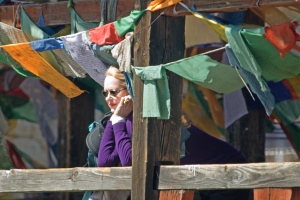
Jane Gray Morrison in Bhutan
Jane Gray Morrison is Executive Vice President of Dancing Star Foundation. Morrison has been making films about the environment ever since retiring at a young age as an opera singer in Europe. In more than 30 countries she has brought to public focus issues pertaining to biodiversity loss, animal protection, pollution, human health, and explored stunning interdisciplinary approaches to mitigating conflicts, whether in Ireland, India, China or the Antarctic. Morrison produced the ten-hour epic docu-drama, Voice of the Planet, for Turner Broadcasting, which involved filming for two years in 25 countries. The series was a veritable biography of the earth, starring William Shatner and Faye Dunaway, and detailed such themes as water, chemical and oil pollution, animal cruelty, deforestation, the population explosion, the history of imagination in the wilderness, alternative energy and ecological anthropology. In later films, Morrison has chronicled the crisis of industrialized agriculture, the crisis of human consumerism and its impact on habitat, and biodiversity loss. As a filmmaker, Morrison has produced numerous films for such networks as Discovery, PBS (where she also co-directed A Day in the Life of Ireland for Irish Television and WNET/New York). Morrison recently completed a feature film documentary trilogy; Mad Cowboy, No Vacancy and Hotspots.
Her expertise ranges from the behavioral ecology of burros, to ecological restoration issues in New Zealand, ecological aesthetics, and family planning. Many of these topics have emerged in her several books.
As Executive Vice President of Dancing Star Foundation for nearly a decade, Morrison has worked with partners in two dozen countries in an effort to help increase protection for threatened habitats, as well as overseeing domestic sanctuaries protecting rescued farm animals. Morrison also oversees a program sponsored by Dancing Star Foundation at UCLA Medical School that brings together new and vital research and education with the goal of ending cancer through integrative oncology innovation.
Books and films by Jane Gray Morrison »
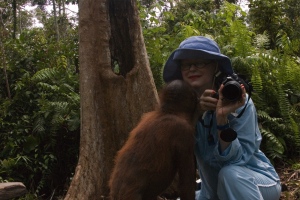
Jane Gray Morrison in Borneo

